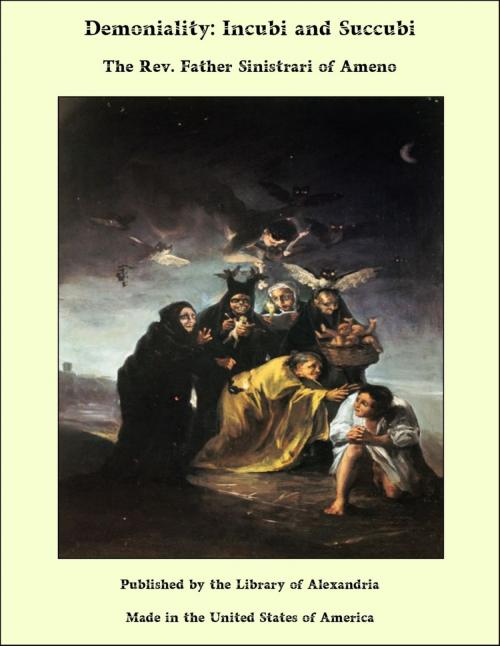Demoniality: Incubi and Succubi
Nonfiction, Religion & Spirituality, New Age, History, Fiction & Literature| Author: | The Rev. Father Sinistrari of Ameno | ISBN: | 9781465614131 |
| Publisher: | Library of Alexandria | Publication: | March 8, 2015 |
| Imprint: | Language: | English |
| Author: | The Rev. Father Sinistrari of Ameno |
| ISBN: | 9781465614131 |
| Publisher: | Library of Alexandria |
| Publication: | March 8, 2015 |
| Imprint: | |
| Language: | English |
The first author who, to my knowledge, invented the wordDemoniality is John Caramuel, in his Fundamental Theology, and before him I find no one who distinguished that crime fromBestiality. Indeed, all Theological Moralists, following in the train of S. Thomas (2, 2, question 154), include, under the specific title of Bestiality, “every kind of carnal intercourse with any thing whatever of a different species”: such are the very words used by S. Thomas. Cajetanus, for instance, in his commentary on that question, classes intercourse with the Demon under the description of Bestiality; so does Sylvester, de Luxuria, Bonacina,de Matrimonio, question 4, and others. However it is clear that in the above passage S. Thomas did not at all allude to intercourse with the Demon. As shall be demonstrated further on, that intercourse cannot be included in the very particular species of Bestiality; and, in order to make that sentence of the holy Doctor tally with truth, it must be admitted that when saying of the unnatural sin, “that committed through intercourse with a thing of different species, it takes the name of Bestiality”, S. Thomas, by a thing of different species, means a living animal, of another species than man: for he could not here use the word thing in its most general sense, to mean indiscriminately an animate or inanimate being. In fact, if a man should fornicate cum cadavere humano, he would have to do with a thing of a species quite different from his own (especially according to the Thomists, who deny the form of human corporeity in a corpse); similarly si cadaveri bestiali copularetur: and yet, talis coitus would not be bestiality, but pollution. What therefore S. Thomas intended here to specify with preciseness, is carnal intercourse with a living thing of a species different from man, that is to say, with a beast, and he never in the least thought of intercourse with the Demon.
The first author who, to my knowledge, invented the wordDemoniality is John Caramuel, in his Fundamental Theology, and before him I find no one who distinguished that crime fromBestiality. Indeed, all Theological Moralists, following in the train of S. Thomas (2, 2, question 154), include, under the specific title of Bestiality, “every kind of carnal intercourse with any thing whatever of a different species”: such are the very words used by S. Thomas. Cajetanus, for instance, in his commentary on that question, classes intercourse with the Demon under the description of Bestiality; so does Sylvester, de Luxuria, Bonacina,de Matrimonio, question 4, and others. However it is clear that in the above passage S. Thomas did not at all allude to intercourse with the Demon. As shall be demonstrated further on, that intercourse cannot be included in the very particular species of Bestiality; and, in order to make that sentence of the holy Doctor tally with truth, it must be admitted that when saying of the unnatural sin, “that committed through intercourse with a thing of different species, it takes the name of Bestiality”, S. Thomas, by a thing of different species, means a living animal, of another species than man: for he could not here use the word thing in its most general sense, to mean indiscriminately an animate or inanimate being. In fact, if a man should fornicate cum cadavere humano, he would have to do with a thing of a species quite different from his own (especially according to the Thomists, who deny the form of human corporeity in a corpse); similarly si cadaveri bestiali copularetur: and yet, talis coitus would not be bestiality, but pollution. What therefore S. Thomas intended here to specify with preciseness, is carnal intercourse with a living thing of a species different from man, that is to say, with a beast, and he never in the least thought of intercourse with the Demon.















